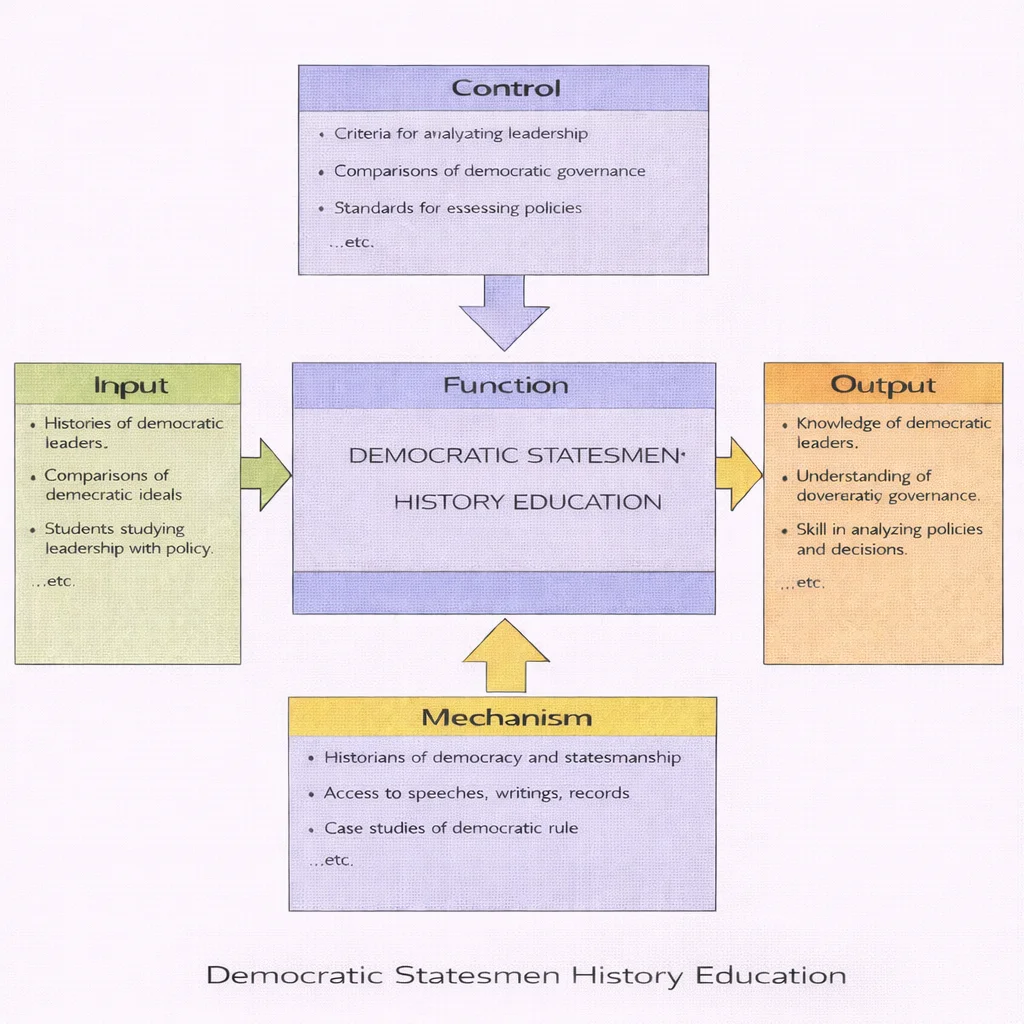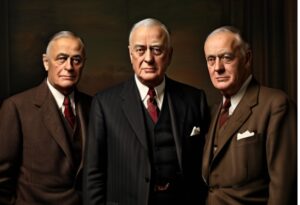Democratic Statesmen History Education turns biographies, speeches, debates, and key turning points into a disciplined way of thinking about leadership in democratic life. As the diagram suggests, the learning begins with rich inputs—stories of leaders and the ideals they argued for—then moves beyond admiration into comparison: how different societies defined representation, accountability, rights, and compromise. The “Control” elements are what keep this study honest: clear criteria for judging leadership, standards for assessing policies, and frameworks for comparing democratic governance across time and place. With the right “Mechanism”—teachers who can connect context to evidence, access to primary records, and well-chosen case studies—students gain outputs that matter: a grounded understanding of democratic statesmen, a clearer sense of how democratic systems actually work, and practical skill in analysing decisions, trade-offs, and long-term consequences.

Democratic statesmen have long stood at the crossroads of principle and pragmatism, shaping nations through a blend of ethical leadership and political strategy. Their emergence and legacy are best understood within the broader framework of history of political systems and the diversity of political ideologies that define democratic life. Unlike authoritarian rulers, democratic leaders operate within constitutional limits, shaped by public accountability and institutional checks, yet their influence can be transformative.
To appreciate their significance, one must consider their engagement in political campaigns and their adaptation to modern challenges, including the role of technology in elections. The ability of democratic leaders to connect with diverse constituencies, often across geographic and economic divisions, is a recurring theme in political biography and media and communication history.
Central to the evolution of democratic leadership is the advancement of civil liberties and the rule of law. Landmark reforms spearheaded by democratic statesmen are often intertwined with suffrage and civil rights movements, as well as broader currents in social history. These movements—and the leaders who supported or resisted them—reveal tensions between tradition and progress, between elite authority and grassroots mobilization.
In international affairs, democratic statesmen frequently engage in nuanced diplomacy and coalition-building, often analyzed through treaty analysis and military diplomacy. Their roles in global peace efforts are closely aligned with themes in peace studies and conflict resolution. Far from passive observers, democratic leaders have often played decisive roles in shaping international orders, participating in wars as documented in military history and military strategic studies, and later advancing recovery through trade and cooperation explored in trade and commerce history.
The intellectual underpinnings of democratic leadership are reflected in the history of ideas and the history of economic thought. Statesmen who promote fiscal responsibility, welfare expansion, or constitutional reform must navigate the competing pressures of political economy and shifting global conditions, including the political economy of crises. Their policies often have tangible impacts on urban and rural history, where infrastructure, education, and public health reform become testaments to democratic governance.
Finally, the moral compass and practical acumen of democratic statesmen are tested in moments of profound national or global transformation. Their choices affect migrations, as studied in migration and diaspora studies, and in times of conflict, they must reconcile ideals with the realities of power, as shown in naval history and the technological history of warfare. Examining their legacies provides not only insight into leadership, but also an evolving definition of democracy itself—one shaped by context, crisis, and conscience.

The image shows three older men in dark suits and ties posed closely together in a dignified, formal setting. Their serious expressions and restrained composition suggest an official or historical portrait associated with public service and high office. As an introductory visual for “Democratic statesmen,” the scene can represent leadership within constitutional limits—negotiation, coalition-building, parliamentary debate, and decision-making constrained by law, elections, and public scrutiny.
Table of Contents
Key Characteristics of Democratic Statesmen
Commitment to Democratic Principles
Democratic statesmen prioritize values like accountability, transparency, equality, and the rule of law.- Example:
- Jawaharlal Nehru emphasized secularism, democracy, and socialism in shaping India’s post-independence political framework.
Visionary Leadership
They possess a forward-thinking perspective, often articulating a vision that aligns with democratic ideals while addressing immediate challenges.- Example:
- Franklin D. Roosevelt’s New Deal policies were visionary in addressing the economic devastation of the Great Depression while preserving democratic structures.
Crisis Management
Democratic statesmen often emerge during crises, navigating their nations through wars, economic turmoil, or societal upheavals while safeguarding democratic norms.- Example:
- Winston Churchill’s leadership during World War II demonstrated resilience and determination in defending democratic Europe against authoritarianism.
Institution-Building
They invest in strengthening democratic institutions, ensuring the longevity of democratic governance beyond their tenure.- Example:
- Nehru’s establishment of a robust parliamentary democracy in India provided a foundation for its long-term democratic stability.
Inclusive Governance
Democratic statesmen emphasize inclusivity, ensuring that diverse voices and communities are represented within the political system.- Example:
- Roosevelt’s policies sought to address the needs of various segments of American society, including workers, farmers, and the unemployed.
Historical Examples of Democratic Statesmen
Franklin D. Roosevelt (United States)
- Context:
- Served as President of the United States (1933–1945) during the Great Depression and World War II.
- Key Contributions:
- The New Deal:
- A series of economic and social reforms aimed at providing relief, recovery, and reform during the Great Depression.
- Leadership During World War II:
- Mobilized the U.S. to become the “Arsenal of Democracy,” supplying the Allies with resources and leading the war effort after the Pearl Harbor attack.
- Institutional Strengthening:
- Expanded the federal government’s role in economic regulation and social welfare while preserving democratic processes.
- The New Deal:
- Legacy:
- Roosevelt’s leadership preserved democracy during periods of immense economic and global uncertainty, setting a precedent for government intervention in times of crisis.
Jawaharlal Nehru (India)
- Context:
- India’s first Prime Minister (1947–1964) following independence from British colonial rule.
- Key Contributions:
- Establishing Democratic Institutions:
- Strengthened India’s parliamentary democracy, creating a Constitution that upheld secularism, equality, and fundamental rights.
- Economic Modernization:
- Advocated for a mixed economy with significant state involvement in industrialization and infrastructure development.
- Non-Aligned Movement:
- Championed an independent foreign policy during the Cold War, avoiding alignment with either superpower bloc.
- Establishing Democratic Institutions:
- Legacy:
- Nehru’s leadership laid the groundwork for India’s democratic resilience and its emergence as a major global democracy.
Winston Churchill (United Kingdom)
- Context:
- Prime Minister during World War II (1940–1945, 1951–1955) and a staunch defender of democratic Europe.
- Key Contributions:
- Wartime Leadership:
- Churchill rallied the British people during the darkest days of the war, using stirring speeches to inspire resistance against Nazi Germany.
- Example:
- His famous “We shall fight on the beaches” speech exemplified his determination to defend democracy.
- Atlantic Charter:
- Co-authored with Franklin D. Roosevelt, outlining shared democratic principles and post-war goals, including self-determination and free trade.
- Post-War Advocacy:
- Played a key role in envisioning European unity, which later influenced the creation of the European Union.
- Wartime Leadership:
- Legacy:
- Churchill is celebrated for his defense of democracy against authoritarian regimes, even as his domestic policies faced criticism.
Themes in the Study of Democratic Statesmen
Balancing Leadership and Popular Will
Democratic statesmen often face the challenge of making difficult decisions that may not initially align with public opinion but serve long-term democratic interests.- Example:
- Roosevelt’s decision to enact sweeping New Deal reforms faced opposition from conservatives but ultimately restored public confidence in democracy.
Navigating Internal and External Challenges
These leaders must manage both domestic issues, such as economic inequality, and external threats, such as war or imperialism.- Example:
- Nehru balanced internal social reforms with the need to assert India’s independence on the global stage.
Promoting International Cooperation
Democratic statesmen often advocate for collaboration between nations to promote peace, stability, and shared democratic values.- Example:
- Churchill and Roosevelt’s collaboration during World War II exemplified international democratic solidarity.
Impact of Democratic Statesmen
Strengthening Institutions
Democratic statesmen build and reinforce institutions that protect rights, ensure accountability, and promote governance.- Example:
- Nehru’s establishment of an independent judiciary and free press in India.
Defending Democratic Values
They act as defenders of democracy during periods of authoritarian threat, ensuring the survival of democratic governance.- Example:
- Churchill’s leadership during World War II preserved democracy in Europe against the spread of fascism.
Shaping Public Discourse
Democratic statesmen use rhetoric and public engagement to foster trust in democratic processes.- Example:
- Roosevelt’s “Fireside Chats” reassured Americans during the Great Depression and World War II.
Challenges Faced by Democratic Statesmen
Balancing Power and Democracy
While wielding significant authority, democratic statesmen must avoid the concentration of power that undermines democratic systems.- Example:
- Critics argue that Roosevelt’s unprecedented four terms risked setting a precedent for executive overreach.
Addressing Societal Inequalities
Democratic leaders often face pressure to address systemic inequities while maintaining public support.- Example:
- Nehru’s efforts to uplift marginalized communities in India were met with resistance from entrenched elites.
Preserving Unity Amid Diversity
Leaders must navigate the challenges of diverse populations and competing interests within democratic frameworks.- Example:
- Nehru worked to unify a newly independent India, composed of diverse linguistic, religious, and cultural communities.
